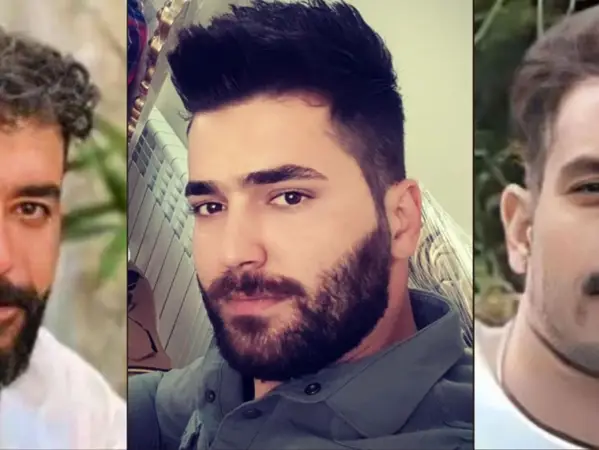Three political prisoners on death row in Iran have written from jail urging the people to stop their execution.
Saeed Yaqoubi, Saleh Mirhashmi and Majid Kazemi, were convicted over the death of two IRGC’s Basij militia members and a police officer in protests of November last year, in what Persian media have dubbed the ‘Esfahan (Esfahan) House’ case.
Describing themselves as "children of Iran" in the letter, the three prisoners said: "Hello. We ask our dear fellow citizens not to let them kill us. We need your help. We need your support."
Amir Kazemi, Majid's cousin, verified the authenticity of the hand-written letter in an interview with Prague-based Farsi language Radiofarda.
After authorities released videos of three protesters confessing to the killing of three security officers their families expressed concern about their imminent execution.
On Sunday night and again on Wednesday night, people gathered outside Esfahan (Isfahan) Central Prison hoping to stop the feared hangings.
Videos posted by activists show dozens chanting slogans in front of the prison, while gunfire was also heard as thick smoke caused by teargas enveloped the area.
Opposition activists say the death penalty is being used against the Isfahan House three as an intimidation tactic to stop further protests.
Campaigners say the prisoners were tortured into confessions, and there is no reliable evidence against them.
Earlier in the day, Diana Eltahawy, Amnesty International’s Deputy Director for the Middle East and North Africa, called on the international community to take bold action to prevent the execution of the three protesters who were tortured into confessing.
“The shocking manner in which the trial and sentencing of these protesters was fast-tracked through Iran’s judicial system amid the use of torture-tainted ‘confessions’, serious procedural flaws and a lack of evidence is another example of the Iranian authorities’ brazen disregard for the rights to life and fair trial,” she said.
Majid Kazemi said in an audio recording from prison that he was forced to make false self-incriminating statements after interrogators beat him, gave him electric shocks, subjected him to mock executions, and threatened to rape him, execute his brothers and harass his parents.
Iranian expatriate communities plan demonstrations against the executions in cities worldwide on Saturday, May 20.
In a separate development, Iran International has learned that hearings were held for seven people detained during the ‘Women, Life, Liberty’ protests at the Revolutionary and Criminal Courts of Tabriz in the past few days. They were arrested in the city in September and November last year during protests following the death in custody of 22-year-old Mahsa Amini.
The seven -- identified as Pejman Eslami (31), Baqer Taji Ahmadifard (35), Mehdi (Safa) Fanai(41), Alireza Shirdel(33), Amir Ahmadian (21), Anoush Adami (34) and Omid Abdollah-Beigi (35) -- were charged with various crimes such as ‘Moharebeh’ that can lead to a death sentence.
Moharebeh (also transliterated as muharebeh) is an Islamic-Arabic term that in the lexicon of the Iranian regime means "fighting God” or “war against God,” and carries the death penalty. “Corruption on earth” is also another term that carries the death penalty.
According to unconfirmed reports, at least 10 underage protesters are also facing death sentences for the “moharebeh” and “corruption on earth”.
Nationwide protests that erupted after the death of Kurdish Iranian Mahsa Amini on September 16, posed the biggest internal challenge to the Islamic Republic since its establishment in 1979. So far, around 500 civilians have been killed by security forces and at least 20,000 arrested. While many have been released, around 1,500 face criminal charges, and at least 80 detainees face the death sentence.
